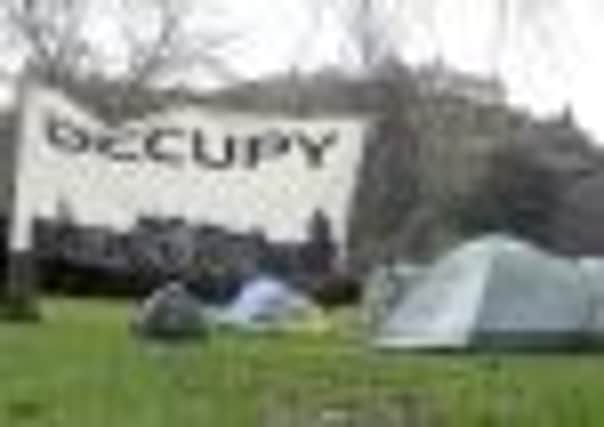Occupy protesters say they will move if asked but set up camp elsewhere in Capital


Members of Occupy Edinburgh – who say they are fighting corporate greed – have taken over the prime city centre spot which just two weeks ago hosted a Hogmanay party envied around the world.
The city council has ordered the group to leave and campaigners said they would go if handed an official eviction notice. But they warned their “roving camp” would find a new home for “people at the bottom of society”.
Advertisement
Hide AdAdvertisement
Hide AdEdinburgh University student Ellie Stewart, a member of Occupy, said they did not want city leaders spending money forcing through an eviction.
She said: “If they hand us an eviction, we’ll move. We are here to provide hope and we have to have a physical presence somewhere. The idea for this protest was to create a roving camp – today we are in Princes Street Gardens, next week we could be somewhere else.
“If an eviction notice were to pop up tomorrow morning we’d move, we’re not about costing the average person money.”
The protesters, who staged a four-month occupation of St Andrew Square in 2011, have no on-site toilets but vowed to protect the showpiece green space, which closes at night.
Psychology student Ms Stewart, a 25-year-old from Newington, said: “None of us are homeless, when it comes to washing and toilet facilities, we all have places to go.”
The city council has held talks with the camp, but cannot force members out without an eviction notice.
Another protester, who did not want to be named, said the council was not being open enough with the Occupy movement.
He said: “Nobody engages us on our terms, instead just calling police and making decisions behind closed doors when they could just speak to us. If they’d just come and spoken to us, there wouldn’t be half as many problems.”
Advertisement
Hide AdAdvertisement
Hide AdA large group from Occupy set up camp in St Andrew Square between October 2011 and last January. Despite initially being well received by the public and local traders, relations soured after business leaders said they had received repeated complaints of members using gardens as a toilet.
Heavy drinking and drug use were also reported and the camp was only disbanded before a forced eviction sanctioned by Edinburgh Sheriff Court in late January.
Around 50 people attended a rally at St Andrew Square on Saturday but voted against proposals to stage a new occupation of that site.
Andy Neal, chief executive of the business group Essential Edinburgh, which represents 600 city centre traders, was at the rally on Saturday and said a hard core of members appeared determined to camp.
He said: “We’re still not entirely clear what will happen because there’s another assembly at 3pm on Saturday in St Andrew Square. If Occupy want to stand and have a meeting in the square that’s fine, but they know camping is out of the question.”
Councillor Cammy Day, community safety leader, said: “The council works jointly with its partners to facilitate peaceful and lawful protests, however our position is quite clear – we do not allow camping in Princes Street Gardens.
“We will be asking the Occupy Edinburgh protesters to leave and are currently seeking legal advice. We are also liaising closely with Lothian and Borders Police.”
Strained relationship
Relations between the Occupy movement and city chiefs have been strained since a protest last winter attracted floods of complaints over antisocial behaviour, drinking and drug taking.
Advertisement
Hide AdAdvertisement
Hide AdThe Occupy Edinburgh camp in St Andrew Square between October 2011 and January 2012 was initially well received.
But the situation turned hostile after traders on the square complained that protesters had been threatening workers, intimidating the public, damaging grass, vandalising the site, behaving in an “aggressive and antisocial manner”, urinating in public and defecating on site.
The campaigners switched to the Meadows after legal moves were launched to evict them, but they soon received new demands to leave, with council leaders insisting camping in the Meadows was forbidden.